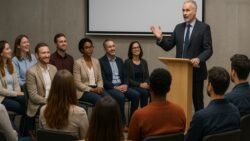Workshops for Educators – Workshops for educators play a vital role in enhancing the teaching of epistemology and critical thinking in schools and colleges. In today’s world, where students are constantly exposed to a flood of information, the ability to question, analyze, and evaluate knowledge is essential. Epistemology, the study of knowledge itself, helps learners understand what qualifies as truth, belief, and justification. Educators who undergo such workshops gain practical strategies to introduce these concepts in classrooms in an engaging and relatable way. The goal is not only to teach students facts but also to empower them with the ability to think independently and critically. These workshops often combine theory with interactive activities, case studies, and real-life examples, ensuring that teachers are well-equipped to guide students toward intellectual maturity. By fostering these skills, educational institutions can prepare young minds to handle complex ethical, social, and scientific issues with reason and clarity, creating responsible and thoughtful citizens for the future.

Importance of Teaching Epistemology in Schools
Introducing epistemology in schools allows students to question assumptions, recognize biases, and critically evaluate information. This is especially significant in an age dominated by social media and misinformation, where young learners are exposed to conflicting narratives daily. By exploring fundamental questions such as “What is truth?” or “How do we know what we know?”, students develop analytical tools to navigate uncertainty. Teachers, through specialized workshops, learn how to simplify these abstract concepts without losing their depth. They also gain access to lesson plans and innovative teaching materials that make philosophy and reasoning accessible even to younger audiences. Schools that integrate epistemology into their curriculum foster intellectual curiosity, encourage respectful debates, and build resilience against dogmatic thinking. Such initiatives not only enhance academic performance but also help students become reflective individuals who can make balanced decisions in personal and professional life.
 Research at the Institute of Epistemics: Bridging Philosophy, Logic, and Cognitive Science
Research at the Institute of Epistemics: Bridging Philosophy, Logic, and Cognitive Science
Building Critical Thinking Through Interactive Methods
Workshops designed for educators place a strong emphasis on interactive teaching methods that build critical thinking. Instead of traditional lecture-based approaches, they incorporate group discussions, debates, role-play exercises, and problem-solving tasks. For example, teachers may use thought experiments, like the “brain in a vat” scenario, to spark students’ imagination and inquiry. Critical thinking exercises also include analyzing media sources, interpreting case studies, or debating moral dilemmas. These activities not only enhance reasoning skills but also improve communication, empathy, and collaborative learning among students. Educators are trained to create safe spaces for inquiry, where students feel encouraged to ask difficult questions without fear of judgment. By integrating these dynamic methods into daily teaching, educators ensure that critical thinking becomes a habit rather than a one-time skill. Ultimately, such training transforms classrooms into hubs of intellectual engagement and prepares students to address real-world challenges with creativity and rationality.
 Public Lectures and Free Webinars on Knowledge Ethics, Science, and Reason in the 21st Century
Public Lectures and Free Webinars on Knowledge Ethics, Science, and Reason in the 21st Century
Role of Colleges in Advancing Critical Thinking Education
Colleges play a significant role in nurturing advanced levels of critical thinking and epistemic awareness. Unlike schools, where the focus may be on introducing basic philosophical ideas, colleges can delve deeper into complex theories and their applications. Workshops for college educators often explore interdisciplinary connections, showing how epistemology intersects with science, politics, literature, and technology. Teachers are trained to encourage students to critique research methodologies, question established knowledge systems, and propose alternative viewpoints. For instance, analyzing how different cultures perceive truth can broaden students’ global understanding and promote inclusivity. Furthermore, colleges can organize symposiums, seminars, and collaborative projects where critical thinking is applied to pressing social issues. By adopting these approaches, higher education institutions not only prepare students for academic success but also for leadership roles in society. Critical thinking becomes a cornerstone of innovation, ethical leadership, and informed citizenship at the college level.
 Peer-Reviewed Journals, Monographs, and Whitepapers Published by the Institute of Epistemics
Peer-Reviewed Journals, Monographs, and Whitepapers Published by the Institute of Epistemics
Long-Term Benefits of Training Educators in Epistemolog
The long-term benefits of training educators in epistemology and critical thinking extend far beyond the classroom. Teachers who are empowered with these skills cultivate generations of students who are intellectually curious, open-minded, and capable of independent reasoning. Such students are better prepared for the challenges of higher education, the workforce, and civic life. They are less likely to fall prey to misinformation, prejudice, or manipulative ideologies. For educators, these workshops foster continuous professional growth, keeping their teaching methods updated and relevant. Moreover, schools and colleges that prioritize such training build a reputation for excellence and innovation, attracting students and parents who value holistic education. On a societal level, widespread adoption of critical thinking education can contribute to more democratic, tolerant, and progressive communities. By investing in the intellectual development of both teachers and learners, workshops in epistemology create ripples of positive change that strengthen education systems and society as a whole.

